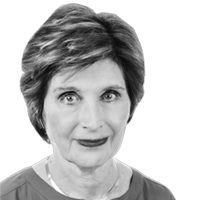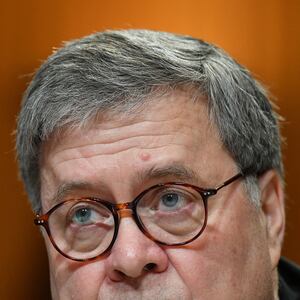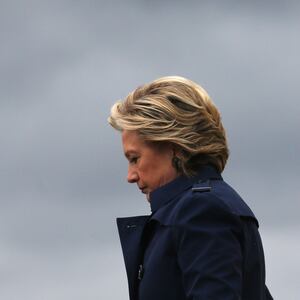Attorney General William Barr has been looking into the Maltese professor Joseph Mifsud, whose discussion with Trump campaign adviser George Papadopoulos helped set off the FBI investigation of possible coordination between the Trump campaign and Russia in 2016. It was Mifsud who told Papadopoulos about the “dirt” the Russians had on Hillary Clinton in the form of “thousands of emails,” a tip Papadopoulos blurted out to an Australian diplomat in an indiscretion that reached the FBI and started the ball rolling.
Barr’s interest is all part of a broader effort pushed obsessively by President Donald Trump in an effort to prove, at least in the public mind, that he was the victim of a conspiracy in 2016 rather than the beneficiary of one. Trump’s pressure on the recently elected government in Ukraine to promote this line features in the impeachment proceedings against him.
But that has only led his administration and supporters to push harder the notion of a sinister “deep state” conspiracy to derail his presidential campaign. Where the pressure on Ukraine was partly the work of Trump lawyer Rudolph Giuliani operating outside official channels, Attorney General Barr’s probe is now a criminal investigation into the origins of the counterintelligence probe into Trump’s Moscow connections.
And Professor Mifsud is right in the middle of it.
The teams led by Special Counsel Robert Mueller and the FBI reported that Mifsud, who disappeared from public view in late 2017, received his information about the Clinton emails through highly placed members of the Russian government, and ex-FBI Director James Comey, fired by Trump, even said that Mifsud was a Russian agent.
Barr and his boys are operating on a different theory—that Mifsud was part of a setup by the CIA and FBI to smear Trump. Pursuing this theory, Barr even went abroad recently to talk with Italian and British intelligence officials about Mifsud, who taught at universities in both Britain and Italy.
But Mifsud’s deep, long-standing connections with Russian President Vladimir Putin’s foreign-policy establishment and the highly favorable views he has expressed publicly about Russia’s role in global affairs show just how far Barr has barked up the wrong tree.
Josef Mifsud, born in Malta in 1960, earned a doctorate in early-childhood education from Queen’s University, Belfast, in 1995. He had a stint at the Maltese Ministry of Foreign Affairs and did some teaching in Slovenia and the University of Stirling in Scotland before becoming the director of the so-called London Academy of Diplomacy in 2012. As columnist Nick Cohen pointed out in The Guardian, it resembled “just the type of front organization an espionage agency would establish.” And when the academy shut down after the Russia scandal erupted in the United States, it was as if "it were an intelligence asset whose cover had been blown."
Mifsud, who briefly employed the Italian wife of Papadopoulos when he was affiliated with a socialist group in the European Union, was by all accounts terrific at networking. After beginning frequent trips to Russia in 2010, he was soon hobnobbing with Kremlin-linked Russians as an expert on international diplomacy, despite his lack of credentials in that field. In 2012 his academy formed a collaboration with Moscow State University, where Mifsud became a regular visitor. And in May 2014, he was received personally by the Russian ambassador to London, Alexander Yakovenko—an unusual honor for someone of Mifsud’s minor stature—to discuss the lofty subject of “Russian-British cooperation in the sphere of international relations, diplomacy, science and education.”
One of Mifsud’s key Russian contacts was Ivan Timofeyev, a young mover and shaker in the Russian foreign-policy establishment, whose résumé includes more than 80 published articles on international affairs.
Timofeyev is an associate professor at the Moscow State Institute for International Affairs (MGIMO), a well-known feeder school for the Russian foreign ministry and the Foreign Intelligence Service (SVR), where he received his doctorate in 2006. Timofeyev is also program director for the Russian Council on International Affairs (RIAC), a think tank whose board of trustees is headed by Russian Foreign Minister Sergei Lavrov.
Unconvincingly, Lavrov denied in October 2017 that he was acquainted with Timofeyev after news broke of the FBI indictment of George Papadopoulos for lying under oath. Timofeyev was discussed in the Papadopoulos’ plea deal only as “a Russian national connected to the Russian Ministry of Foreign Affairs,” but a ministry spokesperson said it learned this was Timofeyev from its embassy in the Washington, and the Mueller Report cites his activities explicitly (his named transliterated as Timofeev).
The prolific wunderkind Timofeyev, whom Misfud referred to as a “dear friend” in a communication with Papadopoulos, also heads the research program at the Valdai Discussion Club, a Kremlin-supported organization that hosts high-profile gatherings, often attended by Putin, of Russian and international elites.
In April 2016, right before Mifsud told Papadopoulos about the Russian dirt on Clinton, Timofeyev hosted a discussion on global stabilization and oil markets in which Mifsud participated, along with his Swiss-German lawyer Stephen Roh, who would later be questioned aggressively by the FBI.
In May 2016, Timofeyev interviewed Mifsud at the Valdai Club about global energy markets. But a more important conversation had occurred behind the scenes: Mifsud had connected Papadopoulos with Timofeyev and the two were laying the groundwork, via Skype and email, for a possible meeting between the Trump campaign and the Russian government.
That same month, Mifsud had a long interview with the Zinoviev Club, a research arm of Russia Today (the Kremlin-controlled media outlet), about resuming a “productive dialogue” between Russia and Europe. Sounding like he had graduated with honors from a KGB disinformation school, Mifsud claimed that Russia was needed in Syria: “Everyone agrees now that the Russian intervention in Syria helped, not worsened, the situation. Whether Assad will remain in power or not is another question, but the fact that there was someone who took the first step to face the situation and not hide it under the carpet helped.”
Mifsud went on to lament that “we see an openly anti-Russian, demonizing Russia view of Western media… we cannot demonize governments, countries, individuals, and then expect a working relationship with them…What I cannot understand is the fact that people trying to build bridges and facilitate dialogue become targets for all this. This should never happen.” He also observed: “Today the EU needs Russia as a strong partner in order to exchange information and to resolve problems in the sphere of cyber threats... of course, the work of security services, special services and the exchange of information with these services are becoming critically important.”
Mifsud’s comments not only echoed the Kremlin line; they also reflected what Trump was starting to say in defense of the Putin regime.
Mifsud’s lawyer Roh, who was detained for questioning by the FBI at JFK Airport in October 2017, has labeled the claims that Mifsud was acting on behalf of the Russians “defamatory.” In a self-published 2018 book, The Faking of Russia-gate: The Papadopoulos Case, an Investigative Analysis, which includes an interview with Mifsud, Roh posited that Mifsud was used as a pawn by Western intelligence services,
But considering Roh’s background, his views can be seen as dezinformatsiya: Roh, who is married to a Russian woman with her own connections and speaks fluent Russian, owns numerous energy consultancies as well as a law firm with offices in major cities, including Moscow. He was also a “visiting fellow” at Mifsud’s strange Diplomatic Academy. One of Roh’s companies, ISL Energy, has published studies in which he, Mifsud, and Timofeyev—the academic superstar—are contributors.
In 2011, Roh formed a business partnership with a Russian entrepreneur named Gleb Ageev, who owns a financial company called Finrusinvest, which earns a huge revenue from contracts with Russian oil companies. From 2007 to 2014, Ageev directed administrative affairs for the now-defunct Federal Agency for the Development of the State Border (Rosgranitsa), which worked closely with the FSB’s powerful Border Service.
Roh does not hide his sympathies for the Putin regime. According to BuzzFeed, just after the March 2018 poisonings with the nerve agent Novichok of Sergei Skripal and his daughter in Salisbury, England, Roh changed the name of one of his British companies, Inverhold Ltd., to No Vichok Ltd. When asked why he made the change, Roh told BuzzFeed in an email that the Salisbury attack was a conspiracy by Western intelligence services.
Roh is an investor in Rome’s Link Campus University, where Western diplomats and retired intelligence officials frequently lecture and Mifsud worked for over a decade.
The president of Link, former Italian Foreign Minister Vincenzo Scotti, a Christian Democrat, recently told The New York Times that Mifsud “was a loudmouth know-nothing,” although he acknowledged that Mifsud helped negotiate a partnership between Link and a Moscow university. And, according to Roh, as cited by the Epoch Times (not necessarily a reliable source) Scotti and Mifsud went to Russia together in October 2016 as part of a Link delegation that was formalizing a cooperation agreement with Moscow State University.
Ex-Minister Scotti was drawn further into the Mifsud scandal last April when Papadopoulos, who has claimed that Mifsud was an Italian intelligence asset used by the CIA, tweeted: “Some disturbing and enlightening news coming out of Italy. Vincenzo Scotti, the former Italian foreign minister, who was one of the intermediaries to Mifsud—has been outed as the guy who ‘forced’ Mifsud to introduce me to imaginary Russians and set me up. This is huge.” (Papadopoulos has also accused then-Prime Minister Matteo Renzi of orchestrating the trap allegedly set by Mifsud as a favor to President Barack Obama. Renzi is suing Papadopoulos for defamation in an Italian criminal court over that allegation.)
Scotti said in an email to The Washington Post that he had not been contacted by Barr or his associates: “Absolutely no—nobody, no authority, be it American or Italian, got in touch with us, not even indirectly, on the topic.” Perhaps Barr has chosen to ignore this angle on the advice of the Trump camp, Rudy Giuliani in particular, who has suggested publicly that Mifsud was part of a CIA plot.
It should be clear to Attorney General Barr that Mifsud was no CIA asset, but rather part of a cabal, including Roh and Timofeyev, that spreads pro-Kremlin propaganda under the guise of academia and acts as a conduit between the Kremlin and Western policy wonks who are sympathetic to the Putin regime.
In pursuing his CIA-FBI conspiracy theory, Barr is entering a complicated maze of secret and not-so-secret relationships that characterize Russia’s efforts to undermine Western democracies. If Barr were wise, he would back off.








